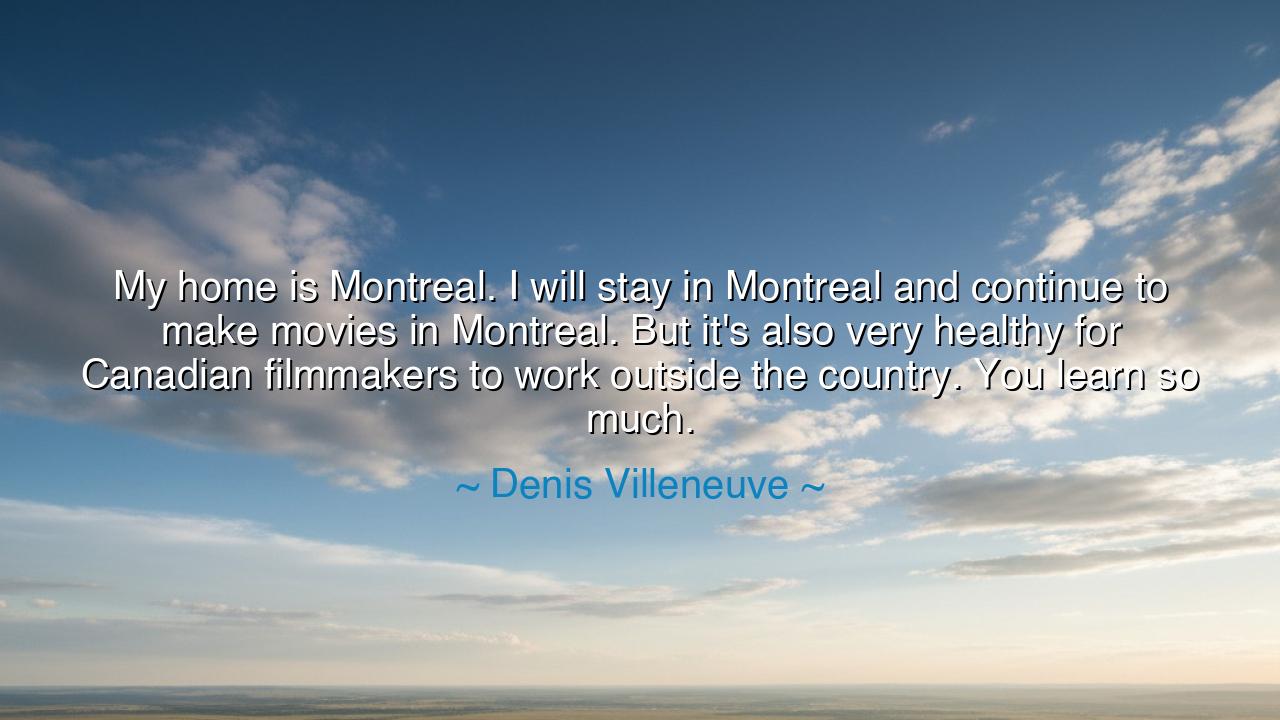
My home is Montreal. I will stay in Montreal and continue to
My home is Montreal. I will stay in Montreal and continue to make movies in Montreal. But it's also very healthy for Canadian filmmakers to work outside the country. You learn so much.






In the journey of life, one must strike a balance between rooting oneself in one’s origins and venturing beyond the familiar to expand one’s horizons. Denis Villeneuve’s words, “My home is Montreal. I will stay in Montreal and continue to make movies in Montreal. But it’s also very healthy for Canadian filmmakers to work outside the country. You learn so much,” speak to this profound tension. Villeneuve acknowledges the importance of being grounded in one’s heritage, but also recognizes that true growth comes from stepping outside the familiar and learning from the vast world beyond. His reflection reveals a timeless wisdom: to grow and reach your full potential, you must honor your roots, but never shy away from the lessons that await beyond your borders.
In the ancient world, great thinkers like Herodotus and Plato often found their wisdom not just from their homelands, but from their journeys to foreign lands. Herodotus, the father of history, traveled far and wide, collecting stories from Egypt, Persia, and the distant lands of India. Through his travels, he gained not only knowledge but also a broader perspective on the human experience. Plato, too, sought wisdom beyond the confines of Athens, traveling to Egypt to study its ancient philosophies before returning to share his newfound insights. These great thinkers understood that true growth does not come from remaining in isolation but through engaging with the wider world, absorbing new ideas, and refining one’s understanding. Much like them, Villeneuve understands that a filmmaker, grounded in the traditions of their home, can elevate their art by embracing the global stage and learning from the diversity of experiences it offers.
The Romans were likewise shaped by their encounters with foreign cultures. The expansion of the Roman Empire brought Roman citizens into contact with a myriad of cultures, philosophies, and artistic expressions. The Romans, while fiercely proud of their heritage, were adept at absorbing the cultures they conquered, and this exchange enriched their art, philosophy, and architecture. The Roman adoption of Greek culture and philosophy, for example, led to the flourishing of Roman literature and art, as they built upon the foundations laid by the Greeks. Similarly, Villeneuve’s assertion that Canadian filmmakers should step beyond their national borders is a call to embrace this spirit of cultural exchange, recognizing that the arts—whether through film, music, or literature—are not confined by nationality but thrive when they draw from a multitude of sources.
In more modern times, filmmakers like Jean-Luc Godard and Francois Truffaut of the French New Wave movement also demonstrated the power of stepping beyond national boundaries. Though deeply rooted in their French origins, their work resonated globally, blending influences from both American cinema and European artistry. Their willingness to experiment, to bring foreign influences into their creative process, and to reflect their own unique cultural context made their films resonate with audiences around the world. Villeneuve, too, exemplifies this spirit, finding ways to fuse his Canadian roots with broader cinematic trends, allowing his art to speak to a global audience. Like the filmmakers of the French New Wave, Villeneuve is not merely a product of his environment; he is a creator who bridges the gap between local identity and universal experience.
The lesson from Villeneuve’s statement is one of balance—the understanding that while our roots are important, the world itself is our classroom. It is a reminder that growth is not limited by geography or nationality. By stepping outside our comfort zones, we open ourselves to new ideas, new experiences, and new ways of thinking. This journey of exploration is as crucial for artists as it is for philosophers, warriors, and leaders. To remain solely in one’s own world, no matter how rich it may be, is to stifle one’s potential. Exploration—whether physical, intellectual, or artistic—reminds us that the world is vast and the lessons it offers are boundless.
In our own lives, whether we are creators, thinkers, or workers in any field, we must take Villeneuve’s words to heart. There is wisdom in remaining true to our roots, in nurturing the connections and traditions that ground us. But there is also profound value in stepping beyond our boundaries, engaging with the world around us, and embracing the diverse perspectives it offers. Much like the ancient explorers and the filmmakers who have shaped our cultural landscape, we must seek out opportunities to grow beyond our familiar surroundings and learn from the wider world. This process of expansion and growth is what enables us to reach new heights, both in our personal lives and in the creative works we bring to the world.
Let us then, like Villeneuve, embrace the journey—honoring our origins while seeking the wisdom that lies beyond them. By doing so, we honor not only ourselves but the greater human story that binds us all together, one where we are both shaped by the past and enriched by the diversity of the present. In this way, our art, our work, and our lives can become richer, more meaningful, and more connected to the greater world that surrounds us. Through this balance of roots and exploration, we can achieve our fullest potential.






AAdministratorAdministrator
Welcome, honored guests. Please leave a comment, we will respond soon